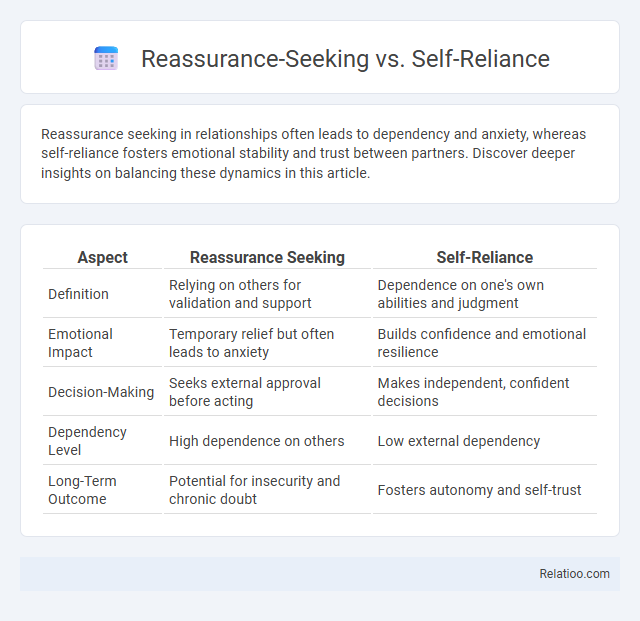Reassurance seeking in relationships often leads to dependency and anxiety, whereas self-reliance fosters emotional stability and trust between partners. Discover deeper insights on balancing these dynamics in this article.
Table of Comparison
| Aspect | Reassurance Seeking | Self-Reliance |
|---|---|---|
| Definition | Relying on others for validation and support | Dependence on one's own abilities and judgment |
| Emotional Impact | Temporary relief but often leads to anxiety | Builds confidence and emotional resilience |
| Decision-Making | Seeks external approval before acting | Makes independent, confident decisions |
| Dependency Level | High dependence on others | Low external dependency |
| Long-Term Outcome | Potential for insecurity and chronic doubt | Fosters autonomy and self-trust |
Understanding Reassurance Seeking: Definition and Causes
Reassurance seeking involves repeatedly asking for confirmation or validation to alleviate anxiety and doubt, often stemming from low self-confidence or fear of making mistakes. In contrast, self-reliance emphasizes trusting one's own judgment and coping abilities without relying on external approval. Understanding reassurance seeking requires recognizing its roots in insecure attachment styles, perfectionism, or underlying anxiety disorders that drive individuals to seek constant affirmation.
Self-Reliance Explained: Meaning and Core Principles
Self-reliance means trusting your own abilities, judgment, and resources to solve problems and make decisions without depending heavily on others. Core principles include confidence in your skills, resilience in facing challenges, and personal responsibility for outcomes. Your ability to cultivate self-reliance reduces the tendency for reassurance seeking, fostering independence and a stronger sense of control over your life.
Psychological Triggers Behind Reassurance Seeking
Reassurance seeking stems from psychological triggers such as anxiety, fear of judgment, and low self-esteem, driving individuals to seek validation from others to alleviate self-doubt. Unlike self-reliance, which fosters confidence and internal trust, excessive reassurance seeking can reinforce dependence and hinder personal growth. Understanding these triggers helps you develop healthier coping mechanisms and build resilience.
Benefits of Building Self-Reliance in Daily Life
Building self-reliance enhances emotional resilience by reducing dependence on external validation, fostering confidence in decision-making and problem-solving abilities. It promotes mental well-being by encouraging proactive coping strategies and reducing anxiety linked to constant reassurance seeking. Developing self-reliance cultivates independence, enabling individuals to navigate challenges effectively and achieve personal growth through increased autonomy.
Negative Impacts of Excessive Reassurance Seeking
Excessive reassurance seeking often leads to increased anxiety and dependence on others for validation, undermining self-confidence and autonomy. It can create relational strain as constant requests for affirmation may be perceived as neediness or insecurity. In contrast, self-reliance fosters emotional resilience and independent problem-solving, reducing vulnerability to stress triggered by uncertainty or self-doubt.
Comparing Emotional Outcomes: Reassurance Seeking vs Self-Reliance
Reassurance seeking often leads to temporary relief from anxiety but can foster dependence on external validation and increase emotional distress over time. In contrast, self-reliance promotes enduring emotional resilience by encouraging individuals to trust their internal judgment and coping abilities. Research indicates that self-reliance is associated with lower levels of anxiety and greater overall emotional well-being compared to the cyclical uncertainty fueled by repeated reassurance seeking.
Strategies to Reduce Reassurance Seeking Behaviors
Reassurance seeking behaviors often stem from anxiety and low self-confidence, prompting individuals to frequently seek validation from others. Strategies to reduce these behaviors include building self-reliance through cognitive-behavioral techniques such as challenging negative thoughts, practicing mindfulness to increase emotional regulation, and gradually facing fears without external validation. Developing strong coping skills and fostering self-trust empowers individuals to depend less on reassurance and more on internal confidence for decision-making.
Practical Tips to Foster Self-Reliance
Reassurance seeking often stems from anxiety and reliance on others' approval, whereas self-reliance builds your confidence through personal decision-making and problem-solving. Practical tips to foster self-reliance include setting small, achievable goals to develop trust in your abilities, practicing mindfulness to reduce dependence on external validation, and gradually limiting requests for reassurance by challenging negative thoughts independently. Strengthening your self-reliance empowers you to handle uncertainty and setbacks with resilience.
Reassurance Seeking in Relationships: Consequences and Solutions
Reassurance seeking in relationships often leads to increased anxiety and dependency, undermining emotional stability and trust between partners. Your constant need for validation can create a cycle of insecurity that prevents self-reliance and personal growth. Developing healthy communication strategies and fostering self-confidence are essential solutions to reduce reassurance seeking and build stronger, more resilient relationships.
Balancing Reassurance and Self-Reliance for Mental Well-being
Balancing reassurance seeking and self-reliance is crucial for maintaining mental well-being by fostering a healthy sense of confidence and emotional stability. Excessive reassurance seeking can lead to dependence and anxiety, while strong self-reliance promotes resilience and problem-solving skills. You can enhance your mental health by recognizing when to seek external support and when to trust your own judgment and abilities.

Infographic: Reassurance Seeking vs Self-Reliance
 relatioo.com
relatioo.com